Simon Elsässer
Simon Elsässer is an Associate Professor at the department of Medical Biochemistry and Biophysics, Karolinska Institutet. He has been studying epigenetic gene regulation in embryonic stem cells during his doctoral and postdoctoral work.

Simon Elsässer has developed novel synthetic biology tools for elucidating the function of proteins inside of living cells and is now establishing a research focus on the small proteome. Short peptides encoded by short open reading frames (sPEPs) are translated abundantly in prokaryotic and eukarytic cells, yet their functions remain mysterious. While examples of such peptides performing essential functions in human tissues are known for over a decade, the breadth and universal relevance of peptides encoded in short open reading frames is only beginning to be explored. Exemplary studies suggest that sPEPs provide a means of intracellular signalling as well as communication between cells within a tissue or between organs in a living animal. Understanding the function of sPEPs may bolster our ability to orchestrate cellular reprogramming or organ development as they could be easily mimicked in vitro. Simon’s research will focus on elucidating the interactomes and functions of sPEPs with respect to their role in intra- and inter-tissue communication. Translational aspects of his research aim to identify new biomarkers, drug targets or blueprints for novel drugs in the small proteome. Through the Ming Wai Lau Center collaborative research environment, Simon aims to elucidate the role of sPEPs in stem cell biology and lineage specification.
Selected Publications
Chromatin Biology
Navarro, C., Lyu, J., Katsori, A.-M., Caridha, R., & Elsässer, S. J. (2020). An embryonic stem cell-specific heterochromatin state promotes core histone exchange in the absence of DNA accessibility. Nature Communications, 11(1), 5095. https://doi.org/10.1038/s41467-020-18863-1
Kumar, B., & Elsässer, S. (2019). Quantitative multiplexed ChIP reveals global alterations that shape promoter bivalency in ground state embryonic stem cells. Cell Reports. https://doi.org/10.1101/557082
Elsässer, S. J., Ernst, R. J., Walker, O. S., & Chin, J. W. (2016). Genetic code expansion in stable cell lines enables encoded chromatin modification. Nature Methods, 13(2), 158–164. https://doi.org/10.1038/nmeth.3701
Elsässer, S. J., Noh, K. M., Diaz, N., Allis, C. D., & Banaszynski, L. A. (2015). Histone H3.3 is required for endogenous retroviral element silencing in embryonic stem cells. Nature. https://doi.org/10.1038/nature14345
Microproteins
Lafranchi, L., Schlesinger, D., Kimler, K. J., & Elsässer, S. J. (2020). Universal Single-Residue Terminal Labels for Fluorescent Live Cell Imaging of Microproteins. Journal of the American Chemical Society, jacs.0c09574. https://doi.org/10.1021/jacs.0c09574
Synthetic Biology
Meineke, B., Heimgärtner, J., Eirich, J., Landreh, M., & Elsässer, S. J. (2020). Site-Specific Incorporation of Two ncAAs for Two-Color Bioorthogonal Labeling and Crosslinking of Proteins on Live Mammalian Cells. Cell Reports, 31(12), 107811. https://doi.org/10.1016/j.celrep.2020.107811
van Husen, L. S., Schedin-Weiss, S., Trung, M. N., Kazmi, M. A., Winblad, B., Sakmar, T. P., Elsässer, S. J., & Tjernberg, L. O. (2019). Dual Bioorthogonal Labeling of the Amyloid-β Protein Precursor Facilitates Simultaneous Visualization of the Protein and Its Cleavage Products. Journal of Alzheimer’s Disease, 72(2), 537–548. https://doi.org/10.3233/JAD-190898
Elsässer, S. J. (2018). Generation of Stable Amber Suppression Cell Lines. In Methods in Molecular Biology (pp. 237–245). https://doi.org/10.1007/978-1-4939-7574-7_15
Meineke, B., Heimgärtner, J., Lafranchi, L., & Elsässer, S. J. (2018). Methanomethylophilus alvus Mx1201 Provides Basis for Mutual Orthogonal Pyrrolysyl tRNA/Aminoacyl-tRNA Synthetase Pairs in Mammalian Cells. ACS Chemical Biology, 13(11), 3087–3096. https://doi.org/10.1021/acschembio.8b00571
Science Policy
Pesic, M., Egamberdieva, D., Kolodziejczyk, B., Elsässer, S. J., Neergheen, V. S., & Kagansky, A. (2020). Towards policies that capture the expected value of biomolecular diversity for drug discovery, human health, and well-being. Biologia Futura. https://doi.org/10.1007/s42977-020-00043-3
Neergheen-Bhujun, V., Awan, A. T., Baran, Y., Bunnefeld, N., Chan, K., dela Cruz, T. E., Egamberdieva, D., Elsässer, S., Johnson, M. V., Komai, S., Konevega, A. L., Malone, J. H., Mason, P., Nguon, R., Piper, R., Shrestha, U. B., Pešić, M., & Kagansky, A. (2017). Biodiversity, drug discovery, and the future of global health: Introducing the biodiversity to biomedicine consortium, a call to action. Journal of Global Health, 7(2). https://doi.org/10.7189/jogh.07.020304
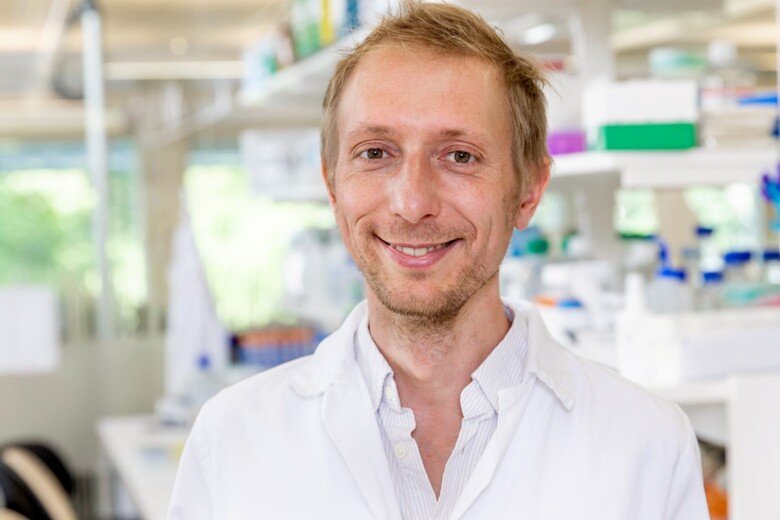 Photo: Gonzalo Irigoyen
Photo: Gonzalo IrigoyenSimon Elsässer has been awarded the 2022 ERC Consolidator Grants
Simon Elsässer is one of the two KI researchers who have been awarded 2022 European Research Council (ERC) Consolidator Grants. The grant will support his project "ChromaDYN: Quantitative multimodal pulse-and-label time-resolved chromatin maps" which studies how cells decide their fate during embryonal development.
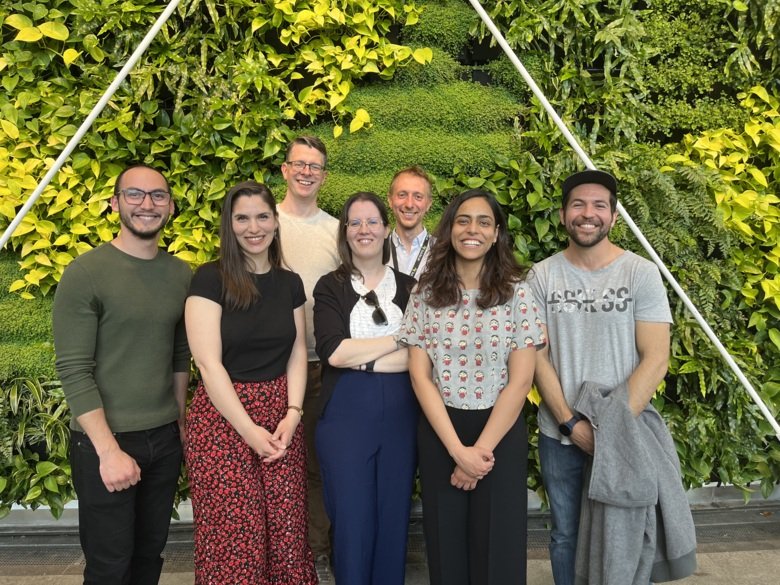 Photo: Banushree Kumar
Photo: Banushree KumarFredrik Lanner and Simon Elsässer's new publication in Nature Cell Biology
Fredrik Lanner and Simon Elsässer joined forces to identify the function of Polycomb Repressor Complex 2 (PRC2) as an epigenetic barrier in maintaining the separation of embryonic and extraembryonic lineages. In this study, the two laboratories elucidate how distinct cell types are established during early human development, which increase our understanding of human development and early pregnancy, and provide an avenue to study disease condition in cellular models.
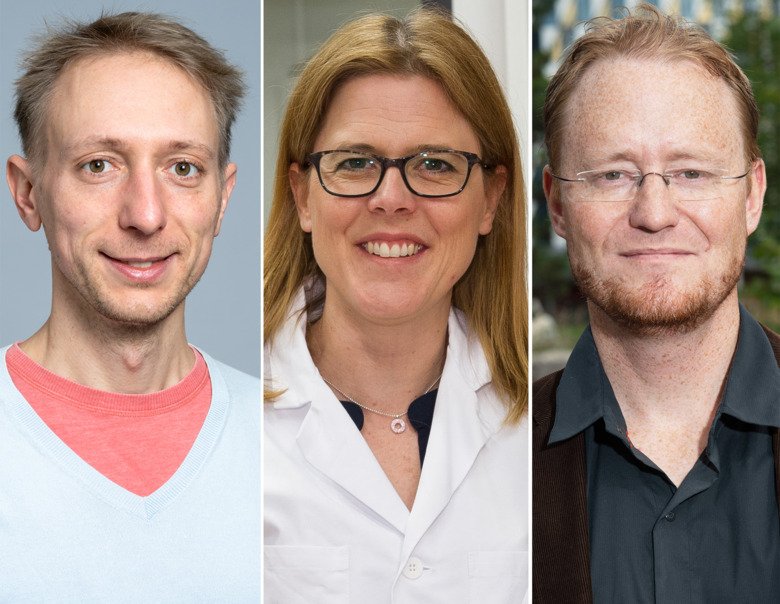 Photo: Johannes Frandsén,Stefan Zimmerman,montage
Photo: Johannes Frandsén,Stefan Zimmerman,montageSimon Elsässer has been awarded the ERC Proof of Concept 2022 Grant
Simon Elsässer is one of the three research group leaders at KI who is awarded the European Research Council Proof of Concept (ERC PoC) 2022 grant. The grant will support his research project on hmqPro, and the work in securing IPR and commercialisation of his technology.
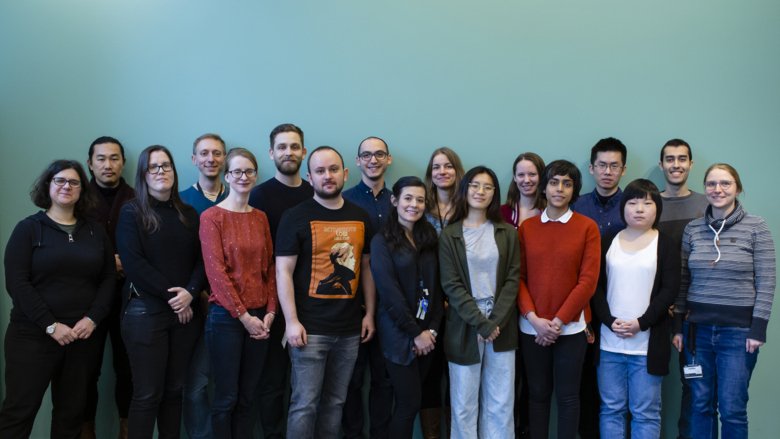 Photo: Simon Elsässer
Photo: Simon ElsässerSimon Elsässer has been awarded the Consolidator grant 2020
Congratulations to Simon Elsässer for being one of the eight awarded candidates for the Consolidator grant! Karolinska Institutet established the Consolidator grant to give the most prominent younger researchers the opportunity to consolidate their research and broaden their activities. The eight awarded candidates this year were selected from 63 qualified applicants, and they would receive up to 1.2 million SEK per year over five years.
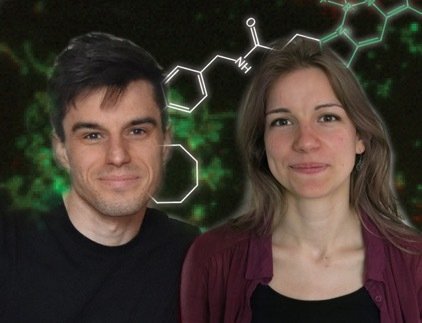 Photo: N/A
Photo: N/ASimon Elsässer’s new publication in Journal of the American Chemical Society
Researchers have been using light microscopes and fluorescent proteins to study how proteins work inside human cells, however they face limitations in studying microproteins which are much smaller than typical proteins, and thus are often overlooked. Simon Elsässer’s team has now developed a method, termed STELLA, which allows fluorescent tagging of proteins with the smallest imaginable perturbation - a single amino acid building block added genetically on either end of the protein. With STELLA, the team was also able to label and localize a number of elusive polypeptides produced by the SARS-CoV-2 coronavirus causing COVID-19.
 Photo: Markus Marcetic © Knut och Alice Wallenbergs Stiftelse/Kungl. Vetenskapsakademien.
Photo: Markus Marcetic © Knut och Alice Wallenbergs Stiftelse/Kungl. Vetenskapsakademien.Simon Elsässer’s new publication in Nature Communications
Pluripotent stem cells are formed at the earliest stage of organismal life and give rise to all different cell lineages that eventually make up the human body. Because of their unique potential to generate any other cell type, pluripotent stem cells bear great value for regenerative medicine. In their latest study published in Nature Communications, Simon Elsässer’s team elucidated how pluripotent stem cells keep mobile DNA elements, omnipresent in animal genomes, in check to avoid genome instability at this crucial stage of development.
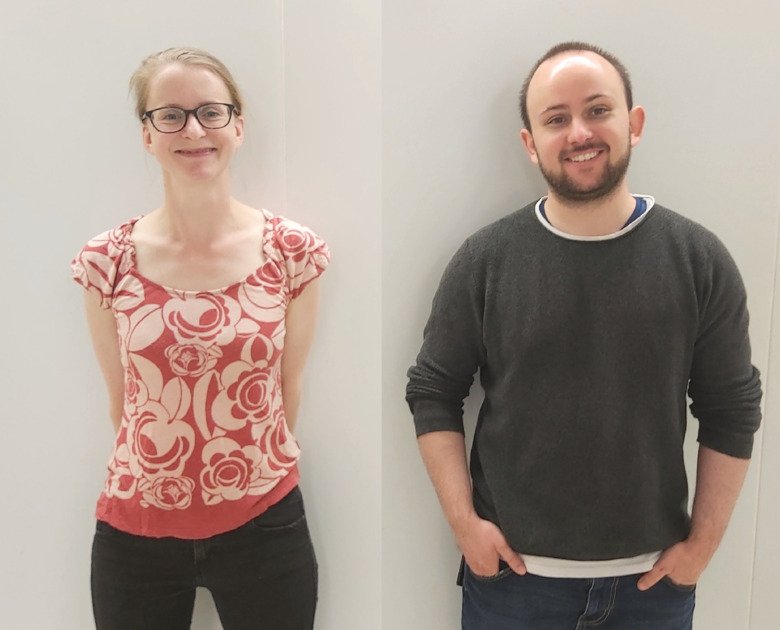 Photo: Private
Photo: PrivateSimon Elsässer’s new publication in Cell Reports
Simon Elsässer’s lab has developed a method to study cell surface receptors on living cells. With very subtle alterations the method allows to label receptors with two different fluorescent probes in defined positions. This can give detailed insights in how the conformation of a receptor changes as a result of for example drug binding, in the natural setting of the cell membrane.
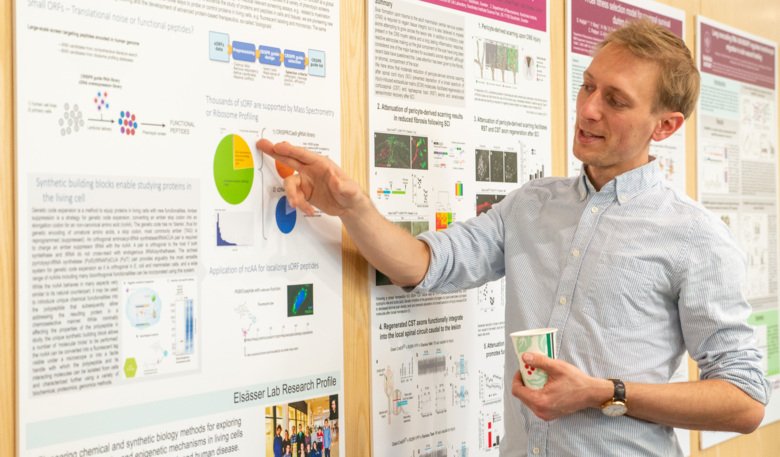 Photo: Patrick Chan
Photo: Patrick ChanSimon Elsässer has been appointed as one of the seventh generation of Future Research Leaders
Simon Elsässer has been awarded a grant from the Swedish Foundation for Strategic Research and receives SEK 12 million funding from 2020-2025. He is one out of 20 recipients selected among a total of 227 applicants.
The aim of the grant is to give young researchers the opportunity to develop and become future leaders of academic and/or industrial research in Sweden.
(In Swedish only)
